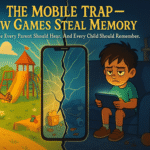
Jealousy in Small Hearts

Honestly, we’ve had enough of our two kids,” said a frustrated mother at the park bench.
“They fight over every little thing! Even when we buy them identical toys, they somehow find a reason to argue. The younger one takes the older one’s things. If we explain to the elder to let it go because ‘he’s younger’, she doesn’t listen. We show them how well other kids play together, but nothing works.”
Table Of Content
This isn’t a one-off situation. It’s a story echoed in countless homes across the world.
The truth is, jealousy among children, especially siblings, is real, raw, and very natural.
Where Does It Begin?
Jealousy is one of the most basic human emotions.
In children, it appears suddenly, loudly, and with intensity.
Unlike adults, kids don’t know how to mask it or control it.
They lash out, they cry, they grab, they sulk.
But what many don’t realize is that jealousy often begins with insecurity.
And insecurity doesn’t come from the child’s weakness,
It usually starts at home.
Overprotection Can Hurt Too
Parents mean well. They want to protect their children.
But sometimes, that protection goes too far.
When we constantly:
- Hover over them
- Help them before they even try
- Doubt their ability because “they’re just a child”
- Overreact to a small bump or scratch
… we are unknowingly telling them: “You’re not capable on your own.” This creates anxiety in the child.
Now add to that…
- An impatient or angry parent
- Household arguments
- Inconsistent discipline at home compared to school
…and that anxiety turns into insecurity. And what does insecurity often turn into?
Jealousy.

The Arrival of a New Baby
One of the most common triggers of childhood jealousy is the birth of a new sibling.
Until that moment, the elder child is the center of the universe.
Everyone’s attention, time, and love flows to them.
Then suddenly, a baby arrives… and everything changes.
Papa comes home and picks up the baby first.
Mummy spends the whole day taking care of the little one.
Relatives bring gifts only for the baby.
Visitors play only with the baby.
The elder child is often warned not to touch the baby because “you’ll hurt him”.
And then comes the final straw,
The place next to Mummy, in her bed, is no longer theirs.
The new baby now sleeps where they once did.
And if the baby arrives before the elder child is fully weaned, and the mother suddenly stops breastfeeding, the emotional wound can go even deeper.
To the older child, it feels like they’ve lost everything, Their space. Their comfort. Their place in the family.

Now Comes the Clash
As the younger child grows and starts playing with the older sibling’s toys, conflict arises.
And what do adults often say?
“You’re the elder one, you should understand.”
“Let him take it, he doesn’t know any better.”
“You have to be the mature one.”
But in the child’s heart, this feels deeply unfair.
“Why do I always have to adjust?”
“Why can’t I get support too?”
The Dangerous Comparison Trap
Another fire-starter? Comparisons.
“Look at how smart your cousin is.”
“He never cries like you do.”
“She eats everything, unlike you.”
“Why can’t you behave like him?”
Parents may think they’re motivating the child.
But the child hears only one message:
“The way I am… is not good enough.”
Especially when they’re compared on things beyond their control, this creates a deep emotional scar.
How Kids Express Jealousy
Not all children throw tantrums.
Jealousy can show up in unexpected ways, like:
- Acting younger than they are
- Thumb-sucking
- Bed-wetting after being toilet trained
- Clinging to the parent constantly
- Making baby-like speech sounds
- Becoming extremely stubborn
- Losing interest in food
- Demanding breastfeeding again
Sometimes, they hurt toys or whisper strange things:
“I’ll take baby brother back to the hospital.”
“I’ll give him to the monster.”
“He’s so annoying.”
To an adult, these words sound cruel.
But to the child, it’s just their way of saying:
“I miss being your baby too.”
So What Can We Do?
- Acknowledge their feelings.
Don’t dismiss their jealousy, recognize it gently. - Avoid unfair expectations.
Don’t make a child grow up too fast just because they’re older. - Stop comparing.
Focus on progress, not perfection. Celebrate their uniqueness. - Give them one-on-one time.
Even 15 minutes of undivided attention can heal a child’s heart. - Let them help with the baby, but don’t force it.
Let them build love at their pace.
Final Thought

Jealousy between siblings is not a parenting failure. It’s a natural part of growing up.
But how we, as parents and teachers, respond to that jealousy, That shapes the kind of adult they’ll grow into.
Will they learn to compete… Or will they learn to care?
Disclaimer:
This article reflects the author’s personal insights and reflections. It is shared with the intention of encouraging thoughtful parenting and generational harmony. The project and foundation are acknowledged as part of the original source for transparency and integrity.




